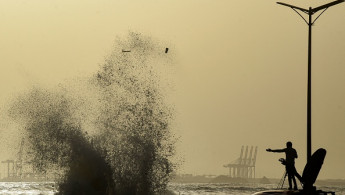Tens of thousands evacuated as Cyclone Biparjoy threatens India, Pakistan
More than 40,000 people have been evacuated across India and Pakistan as a cyclone approaches their coast, officials said Tuesday, with gales of up to 150 kilometres per hour predicted.
The cyclone - named Biparjoy, meaning "disaster" in Bengali - is making its way across the Arabian Sea and is forecast to make landfall as a "very severe cyclonic storm", government weather monitors warned.
In Pakistan's southeastern Sindh province, officials said at least 20,000 people had been evacuated from the storm's path, while across the border in India's Gujarat state, authorities said they had also helped a similar number to move.
India's Meteorological Department said the storm would hit near the Indian port of Jakhau on Thursday evening with winds surging up to 150 kilometres per hour (93 miles per hour).
Sohrab Goth right now #Karachi #CycloneBiparjoy pic.twitter.com/Gt03eNelqg
— Bilal Naseer (@BNKoficial) June 13, 2023
"Over 20,000 people have been evacuated," said C.C. Patel, the official in charge of relief operations in Gujarat state, adding that more people would be moved throughout Tuesday.
Fishing has been suspended along the Gujarat coast where there could be waves of up to three metres (over nine feet), and the Indian Coast Guard on Monday evacuated 50 personnel from an oil drilling ship due to rough conditions.
Indian Prime Minister Narendra Modi on Monday chaired meetings to review the impending cyclone, calling for officials to "take every possible measure to ensure that people living in vulnerable locations are safely evacuated".
Authorities in Gujarat have warned as many as 1.6 million people are likely to be affected in their state, and heavy winds and rains ahead of its arrival have already killed three people.
Two children were killed when a wall collapsed, and a woman was hit by a falling tree while riding a motorbike.
Cyclone #Biparjoy somewhere in #Arabian_sea.#CycloneBiporjoy#Cyclone pic.twitter.com/TUL0AcuNBq
— कप्तान Kaptaan (@jacksparrow3976) June 13, 2023
In Pakistan, the deputy commissioner of Badin district said between 22,000 and 23,000 people had been moved from seafront villages.
Agha Shahnawaz told AFP that up to 10,000 were now living in 13 camps set up in government schools and colleges across the district.
"Initially people were reluctant to leave their places, but we kept pursuing them," Shahnawaz said.
Sindh's provincial information minister Sharjeel Memon put the number of evacuees there at 22,400 around midday on Tuesday.
The Pakistan Meteorological Department said winds gusting up to 120 km/h were forecast along the coast, with storm surges of up to 3.5 metres predicted.
In 2021, the same coast was hit by Cyclone Tauktae, which killed more than 150 people and caused large-scale destruction.
Cyclones - the equivalent of hurricanes in the North Atlantic or typhoons in the Northwest Pacific - are a regular and deadly menace on the coast of the northern Indian Ocean where tens of millions of people live.
Scientists have warned that storms are becoming more powerful as the world gets warmer because of climate change.





 Follow the Middle East's top stories in English at The New Arab on Google News
Follow the Middle East's top stories in English at The New Arab on Google News


